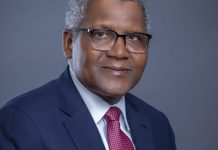By Kelly Ushedo
Guaranty Trust Bank’s announcement of the appointment of Miriam Olusanya as Managing Director was met with approval by industry watchers, and special commendations from advocates of equal pay/opportunity and female empowerment groups.
Miriam Olusanya joins a handful of female Bank MDs in Nigeria and she will be in the company of Halima Buba of Suntrust Bank, Yemisi Edun of FCMB, Nneka Onyeali-Ikpe of Fidelity Bank, Oluwatomi Shomefun of Unity Bank and Ireti Samuel-Ogbu of CitiBank, at the pinnacle of their respective banks; trailblazers in their own rights.
Olusanya also becomes the first female MD of a top tier Nigerian bank (among the FUGAZ), a strictly all men’s club hitherto. Suffice to say that it is with keen interest that her next moves will be watched and analysed.
The capabilities of these female bank MDs notwithstanding, data points to an under-representation of women on the boards of Nigeria’s commercial Banks. The data gathered on the gender parity of the board of top tier banks, commonly called the FUGAZ banks, shows as much.

Of the 22 fully. Commercial Banks registered in Nigeria, five are considered to be top tier by virtue of their size, customer base, stock value, profitability etc. They are the systemic Banks of the industry. They are referred to as FUGAZ.
It is from the websites of these Banks, Access Bank, UBA, Zenith Bank, First Bank, GTBank that data for the analysis on their board constitution viz-a-viz gender was collected on the 17th of July 2021. That of CBN was also added for emphasis.
The findings for the Executive Directors (including the MD) are below:


And for the Board of Directors (including Chairman and MD):

80% of FUGAZ and CBN board of Directors are men.
UBA and FBN have no female Executive Directors on their boards, a deficiency UBA partly compensates for by having 5 female non-Executive Directors out of a total of 13 board members, whereas FBN prefers the status quo as there is only one female non-Executive Director on its 11-member board of Directors.
Zenith and GTB follow closely as new generation banks with more or less the same outlook as the older generation. GTB, who were yet to update their site to reflect their new Holding Company structure, had Miriam Olusanya as its only female Executive Director. She is joined by three other female non-Executive Directors on their board of 13 Directors.
Zenith has a sole female representative in its 12-member board of Directors who doubles as the Deputy Managing Director and could very well be the next female MD of the FUGAZ if hierarchy in the board room is something we can count on.
Access bank, unlike its cohorts, is the only FUGAZ bank to have more than one female Executive Director; the highest number of females on its board with 6, and a female board Chairman. Although its female board concentration (6 females of 17 members) is lower than that of UBA (5 females of 13 members), and it won’t be the first Nigerian Bank to have a female board Chairman, Access bank is definitely walking the talk on gender equality in its board room.
According to the IMF, a resounding YES!
In a 2018 worldwide study by the IMF, which has had a female Managing Director since 2011, it was posited that a higher share of women on boards of banks contributed to higher financial stability. This it said was likely due to the beneficial effects of greater diversity of views and due to discriminatory hiring practices that lead to hiring better qualified or more experienced women than men.
The IMF’s view is in sharp contrast to a HBR research which maintains that there was no evidence that board diversity leads to better financial performance but pointed out that companies that appointed female directors saw a decline in their market values for two years, after which there was no effect. The report suggested that this could be due to investors’ perception that board diversity was motivated by social and not the financial goal of maximizing shareholder value.
While the jury may be out on how much difference, if any, that board gender parity has on the performance of companies, it continues to remain best practice for women to be well represented on boards. Some countries have also used Government mandates to force gender parity on boards.
Based on available data on the board rooms of the FUGAZ banks, one could argue that women in banking have not altogether, shattered the glass ceiling. While the few wins experienced so far are laudable for setting the tone in the industry, we are still a long way from equal pay/opportunity and gender parity.
Ibukun Omololu, a gender parity specialist and ex-banker believes that there has to be a clear strategy by financial institutions if they are to reflect gender parity in their board rooms in the near future. The Principal Consultant at The Teal Tree company is of the opinion that banks need to stop paying lip service to gender parity and take advantage of evidence-based research to develop and implement policies that will address the working conditions of women, empower them, and create a culture that ensures that they have a clear path to the top through mentorship support programs and clear merit-based succession plans.

A cursory look at the constituent list of board of directors of a few other banks outside the FUGAZ shows that poor representation of women on their boards, and in some cases, lack of female Executive Directors in these Banks (Sterling, Wema and Keystone Bank) are a microcosmic effect of the limitations seen in the larger Nigeria population where women are perpetually underrepresented in decision making at the highest levels of their professions.
It would behove the regulators, such as the CBN in this instance, to put provisions in place to make sure that there is fair representation for women in these board rooms.
The CBN’s act of 1991 does not give the CBN explicit powers to enforce gender parity on the boards of banks. Nonetheless, it is common knowledge that in this industry, moral suasion (with incentives) goes a long way in making commercial Banks do the CBN’s bidding especially as gender parity is in line with global best practices.
In order to do this, however, the CBN has to look inwards and restructure its own board where there are only two female Directors in a 12-member board of directors. In this case, charity must definitely begin at home.



![[BREAKING] SYLVESTER OROMONI: LAGOS ORDERS INDEFINITE CLOSURE OF DOWEN COLLEGE ~ Fame News](https://www.famenewsonline.com/wp-content/uploads/2021/12/dowen-218x150.jpg)







































